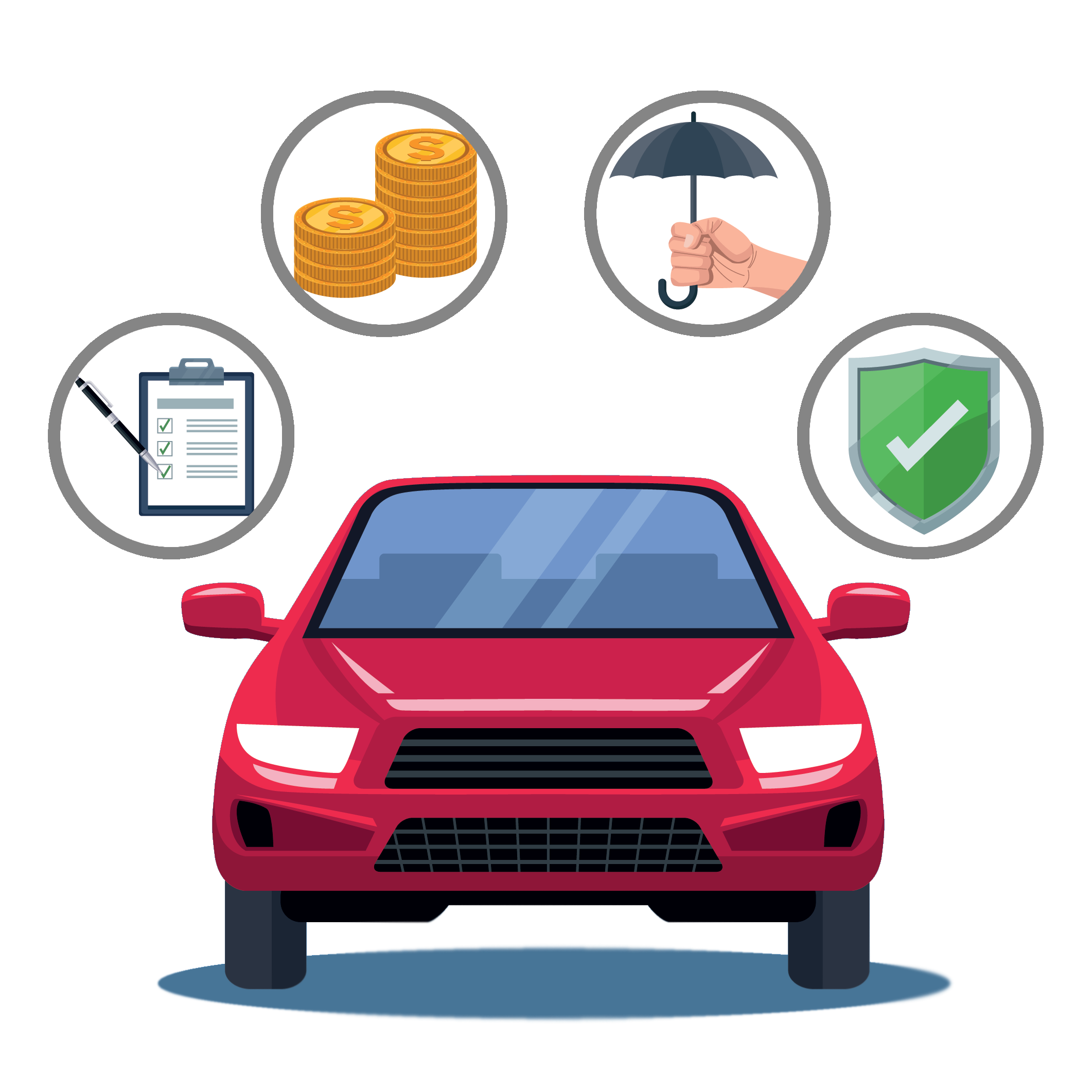Liability Coverage: This is the basic coverage required in nearly every state. It provides financial protection in case you're responsible for an accident, covering the other party's medical expenses and property damage.
Personal Injury Protection (PIP) or Medical Payments Coverage: Some states require PIP or medical payments coverage, which covers medical expenses for you and your passengers, regardless of fault.
Uninsured/Underinsured Motorist Coverage: This coverage steps in if you're involved in an accident with a driver who doesn't have insurance or lacks sufficient coverage to pay for your damages.
Comprehensive Coverage: Although not always required, comprehensive coverage is essential for protecting your vehicle from non-collision incidents like theft, vandalism, or natural disasters.
Collision Coverage: Similarly, collision coverage is not mandatory, but it pays for repairs to your vehicle when you're at fault in an accident.
Gap Insurance: If you're financing or leasing a vehicle, gap insurance covers the difference between what you owe on the vehicle and its actual cash value in the event it's totaled.
Towing and Rental Reimbursement: These optional coverages help with towing expenses and provide a rental car while your vehicle is being repaired.
Importance of Auto Insurance for Individuals with Lower Incomes
Auto insurance is often perceived as an additional financial burden, but it is, in fact, a crucial safety net, particularly for those with lower incomes. Here's why it's essential:
Legal Requirement: As mentioned earlier, auto insurance is legally required in most states. Driving without insurance can result in fines, license suspension, or even legal action. For individuals with limited financial resources, these penalties can be devastating.
Financial Protection: Auto insurance provides financial protection in the event of an accident. Without it, you may be personally responsible for covering medical expenses, property damage, and legal fees, which can quickly spiral out of control.
Peace of Mind: Knowing you have insurance coverage provides peace of mind while driving. It ensures that you won't face a financial crisis if an accident occurs, allowing you to focus on your well-being and that of your passengers.
Asset Protection: For individuals with limited assets, auto insurance safeguards what they have. Without insurance, a lawsuit or a costly accident could lead to the loss of personal assets and future earnings.
Access to Healthcare: Insurance can cover medical expenses resulting from accidents, ensuring that you and your passengers can receive necessary medical care without the burden of high bills.
Shopping for Low Rates: Options and Strategies
For individuals with lower incomes, finding affordable auto insurance is crucial. Here are some strategies and options to consider:
Compare Multiple Quotes: One of the most effective ways to find low-cost auto insurance is to obtain quotes from multiple insurance providers. Online comparison tools make this process relatively straightforward. Make sure to compare policies with similar coverage levels for accurate results.
Consider Usage-Based Insurance: Some insurers offer usage-based insurance, where your premium is based on your driving habits. Safer drivers may qualify for lower rates through this option.
Bundle Your Insurance: If you have other insurance policies (e.g., renters or homeowners insurance), consider bundling them with your auto insurance. Many insurers offer discounts for bundled coverage.
Explore State Programs: Some states offer auto insurance programs specifically designed for low-income individuals. These programs often provide reduced rates or other benefits to eligible drivers.
Look for Discounts: Ask insurance providers about available discounts. Common discounts include safe driver discounts, good student discounts, and discounts for installing safety features in your vehicle.
Maintain a Good Credit Score: Your credit score can impact your insurance premium. Maintaining a good credit score can help you qualify for lower rates.
Adjust Your Coverage: While it's essential to meet your state's minimum coverage requirements, you can adjust other aspects of your policy, such as deductibles and coverage limits, to reduce your premium. Be cautious when lowering coverage, as it can leave you financially vulnerable in the event of an accident.
Drive Safely: Maintaining a clean driving record is one of the most effective ways to keep your insurance rates low. Avoiding accidents and traffic violations can help you qualify for better rates over time.
Tools and Resources for Finding Affordable Auto Insurance
Accessing affordable auto insurance may seem challenging, but several tools and resources are designed to assist individuals with lower incomes:
State Insurance Departments: Your state's insurance department can provide information on insurance options, regulations, and any available programs for low-income individuals.
Online Comparison Tools: Websites and apps like Compare.com, The Zebra, and Insurify allow you to compare quotes from multiple insurers, helping you find the best rates.
Nonprofit Organizations: Some nonprofit organizations, such as the National Association of Insurance Commissioners (NAIC), offer educational resources and assistance for consumers seeking affordable insurance.
Local Community Services: Community organizations and social services agencies may have information on local programs or resources for affordable auto insurance.
Auto insurance is not merely an expense; it's a crucial financial safeguard, especially for individuals with lower incomes. Understanding the coverage requirements in your state and the importance of shopping for low rates is essential to ensure both legal compliance and financial security. By comparing multiple quotes, exploring discounts, and considering usage-based insurance, you can find affordable coverage that fits your budget. Additionally, state programs and nonprofit organizations can provide valuable resources and assistance for those seeking cost-effective auto insurance options. Remember, auto insurance is an investment in your financial well-being and peace of mind on the road.

